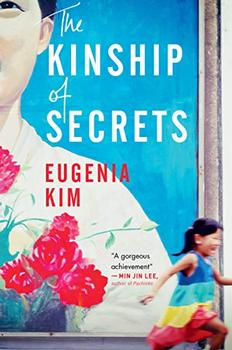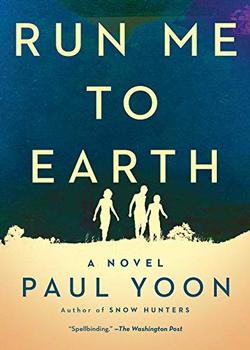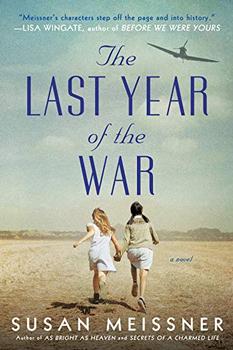Summary | Excerpt | Reading Guide | Reviews | Beyond the book | Read-Alikes | Genres & Themes | Author Bio

Of our 20 First Impressions readers who submitted reviews for The Kinship of Secrets, all rated it four- or five-stars, for an impressive overall rating of 4.5.
What it's about:
The Kinship of Secrets by Eugenia Kim tells the story of two sisters, only ten months apart in age, separated as toddlers. In 1948, Inja is left in South Korea with her uncle, aunt and grandparents as her parents move to the United States in search of better opportunities for their family, taking their other daughter, Miran, with them. Their plan to return for Inja is crushed by the outbreak of the Korean War. Thus, Miran grows up under the shadow of a sister she barely remembers, while Inja receives "care packages" from a family she knows little about (Betty T). When Inja is sent for at age 16 the family must learn to be whole again. Inja must assimilate to both American culture and her nuclear family, while Miran must learn to be a sister. Their parents must move beyond their guilt and belatedly become parents to Inja (Ruthie A). This deeply moving story is told in alternate chapters by the sisters as each describes their upbringing of separation necessitated by the political climate and economic difficulties (Beverly J).
Many readers appreciated the author's personal connection to her narrative:
I felt the book gained credibility from the author's afterword where she mentions that her family went through similar circumstances (Karen L). She describes how later in life she asked her sister what the experience had been like for her and she used this as the basis for the novel (Ruthie A).
Others felt they learned a lot about the Korean War and both Korean and American cultures of the 1950s through 1970s:
I found that the novel offered a great opportunity to learn a piece of history through the eyes of people who lived through the era; I was swept up in the family and their attempts to cope with the situation that years of political unrest put them in (Wanda K). The background and storyline were very interesting, especially for someone without much knowledge of South Korean history. The author really helped that history come alive (Molly B). The information about life in Korea vs life in the USA - where the Korean war was not in the headlines much - was also fascinating (Ruthie A). She used not only political and world events to chart time, but also pop culture references, such as Elvis, Almaden wine (do they still make that?), the Mashed Potato and the Twist, and Dick Clark's TV show American Bandstand (Katherine P).
Many First Impression reviewers also remarked on the differences between how the sisters coped with the changes in their lives:
Over the course of the novel we see the contrast in the way that Inja and her sister are raised. I would have thought that the daughter left behind would be the one with identity and confidence issues, but it is Miran who never feels she fits in. The differences between the ways of life are striking but at the same time very similar. When Inja finally is brought to the United States she is heartbroken, but she has been raised with an inner strength and she thrives (Kay S). One sister had so much, the other struggled. One knew immense love, the other lacked emotional support. Subtle differences are highlighted between belonging and not belonging, having a mother but not having a mother, having a daughter but not having a daughter, being Korean yet not being Korean (Betty T).
Some didn't like the book's pacing:
This book started out a bit slow for me. I found it difficult to remember the details from chapter to chapter and I was slow to keep reading. About half way, I became much more interested and the book picked up quite a bit (Amber H).
Overall our readers enjoyed The Kinship of Secrets, and recommend it:
I read the book in two days. I had trouble putting it down because I wanted to know what was going to happen next (Karen L). It was interesting, thought-provoking and hopeful (Kay S). This book would appeal to many different groups: Korean-Americans; people who enjoy historical fiction; young people; and older people who lived through the Korean War (Karen L). Book clubs will find a wealth of topics to discuss, such as parent-child relationships, sibling bonds and conflicts, the role of secrets within families, the bonds of friendship, and the difficulty of transitioning from one culture to another. I recommend this book to anyone who loves language, powerful storytelling, and well-developed characters (Elizabeth P). Hopefully, novels such as these will spur people to think more deeply about the individuals we read about in the news, especially those too young to influence their own future (Maggie R).
![]() This review was originally published in The BookBrowse Review in January 2019, and has been updated for the
November 2019 edition.
Click here to go to this issue.
This review was originally published in The BookBrowse Review in January 2019, and has been updated for the
November 2019 edition.
Click here to go to this issue.

If you liked The Kinship of Secrets, try these:

by Paul Yoon
Published 2021
From award-winning author Paul Yoon comes a beautiful, aching novel about three kids orphaned in 1960s Laos - and how their destinies are entwined across decades, anointed by Hernan Diaz as "one of those rare novels that stays with us to become a standard with which we measure other books."

by Susan Meissner
Published 2020
From the acclaimed author of Secrets of a Charmed Life and As Bright as Heaven comes a novel about a German American teenager whose life changes forever when her immigrant family is sent to an internment camp during World War II.
Your guide toexceptional books
BookBrowse seeks out and recommends the best in contemporary fiction and nonfiction—books that not only engage and entertain but also deepen our understanding of ourselves and the world around us.